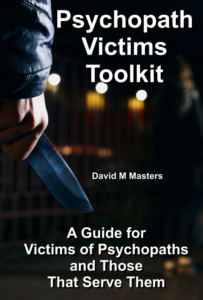Before you start to label anyone as a psychopath, please remember that psychopathy is a spectrum. On one end of the spectrum, there are high-functioning psychopaths with very little effect on society or loved ones. On the other end of the spectrum, the most violent and predatory criminal minds prevail, and every variation of psychopathy can be found in between these two extremes.

My expertise, as the author of the
Psychopath Victims Toolkit, is focused on those who have suffered victimization by predatory psychopaths, and this particular category of “psychopath” is the basis of the psychopath victim’s toolkit. In the material that follows, you will find the tools, tips, techniques, and secrets which have been successfully used by victims to fully recover from psychopathic abuse, which comes in many forms.
Predatory psychopaths are those who seek to devour the energy and resources of their victims to either further their own status or agendas or simply to amuse themselves in the violation of others, without guilt or remorse.

Often, I am asked,
Can a psychopath change?
The most appropriate answer is, “No.” A predatory psychopath cannot change. Yet, I have worked with psychopaths who would no longer be considered predatory psychopaths, and they have effectively rearranged their lives and lifestyles in such a way that no one would ever be victimized by them, and they can live out the remainder of their lives as a “normal” person. But they are not normal, and they fight every day against their true nature to joyfully exploit and victimize others. In much the same way that an alcoholic can change his or her ways and never drink again, so can a predatory psychopath stop victimizing others, though this is extremely rare, indeed.

As the title suggests, author David M Masters, takes a different path in the Psychopath Victims Toolkit, as it was not intended for psychopaths, or people who would like to know more about psychopaths, or those who are as fascinated by the characteristics of psychopaths, as most of us are. No this is an offering specifically intended to be used as A Guide for Victims of Psychopaths and Those
That Serve Them. More specifically, this work is dedicated to the victims and those who offer support for the victim’s recovery, not those who victimize them.
Although enforcing accountability consequences for crimes committed by the psychopaths is briefly addressed, as is the victims’ desire for revenge, the status of the victim while being exploited by a psychopath, separating oneself from the psychopathic stranglehold, and supporting the victim through the recovery process is the goal.
The author’s goal is to first and foremostly see the victim as first protected, then supported, followed by a variety of options that can be of assistance in the psychopath victim’s recovery.
Masters asserts that just as there are such a wide variety of psychopathic styles, variety is also shared among survivors of psychopathic abuse. What both psychopaths and their victims share is vast uniqueness. Just as there are no two psychopaths that are alike, the same goes for the victims. So, there is no cookie-cutter, one size fits all answer for psychopaths or their victims.
Each case is unique, and each victim, while sharing some similarities with other victims, will require his or her own customized approach to the recovery process.
That being said, unsurprisingly,
The Psychopath Victims Toolkit, A Guide for Victims of Psychopaths and Those That Serve Them is a hit with the unintended audience of psychopaths as well. The psychopaths who read this material find some of the material contained herein as abhorrible, and they have attempted to discredit this work and to personally attack the author, which does nothing more than to prove his point.
To reduce this book to its simplest form,
You will find psychopaths in all stations and levels of society and life. The majority of them are unlikely to intimidate or abuse you, some might even focus their unique skillset so as to provide you with protection or a better life. The predatory psychopaths, are out to get you. If not you, someone else, and they will do everything in their power to succeed at whatever it is they desire at any given moment.
As a victim of psychopathic manipulation or abuse, you are not responsible for this. You were sought out and preyed upon by a psychopath because you served a purpose for the predatory psychopath. Early detection and taking action to separate yourself from the predator are of primary importance. Raise your awareness and proceed with caution.
Then from a sacred safe place, you, the psychopath victim, can do your work to remain as safe and secure as possible to conduct the work of taking your life back, healing from the damage done, recovering, and growing to a better personal station in life.
All this can be possible with the tips, tools, and techniques suggested in this text.
If you are in the role of supporting victims of psychopaths, this reference will help you better understand the victim, enabling you to offer a higher degree of understanding and support to the victim without judging or adding to the abuse the victim has already received at the hands of the psychopath.
Post Views: 264
 My expertise, as the author of the Psychopath Victims Toolkit, is focused on those who have suffered victimization by predatory psychopaths, and this particular category of “psychopath” is the basis of the psychopath victim’s toolkit. In the material that follows, you will find the tools, tips, techniques, and secrets which have been successfully used by victims to fully recover from psychopathic abuse, which comes in many forms.
Predatory psychopaths are those who seek to devour the energy and resources of their victims to either further their own status or agendas or simply to amuse themselves in the violation of others, without guilt or remorse.
My expertise, as the author of the Psychopath Victims Toolkit, is focused on those who have suffered victimization by predatory psychopaths, and this particular category of “psychopath” is the basis of the psychopath victim’s toolkit. In the material that follows, you will find the tools, tips, techniques, and secrets which have been successfully used by victims to fully recover from psychopathic abuse, which comes in many forms.
Predatory psychopaths are those who seek to devour the energy and resources of their victims to either further their own status or agendas or simply to amuse themselves in the violation of others, without guilt or remorse.
 Often, I am asked,
Often, I am asked,
 As the title suggests, author David M Masters, takes a different path in the Psychopath Victims Toolkit, as it was not intended for psychopaths, or people who would like to know more about psychopaths, or those who are as fascinated by the characteristics of psychopaths, as most of us are. No this is an offering specifically intended to be used as A Guide for Victims of Psychopaths and Those
That Serve Them. More specifically, this work is dedicated to the victims and those who offer support for the victim’s recovery, not those who victimize them.
Although enforcing accountability consequences for crimes committed by the psychopaths is briefly addressed, as is the victims’ desire for revenge, the status of the victim while being exploited by a psychopath, separating oneself from the psychopathic stranglehold, and supporting the victim through the recovery process is the goal.
The author’s goal is to first and foremostly see the victim as first protected, then supported, followed by a variety of options that can be of assistance in the psychopath victim’s recovery.
Masters asserts that just as there are such a wide variety of psychopathic styles, variety is also shared among survivors of psychopathic abuse. What both psychopaths and their victims share is vast uniqueness. Just as there are no two psychopaths that are alike, the same goes for the victims. So, there is no cookie-cutter, one size fits all answer for psychopaths or their victims.
Each case is unique, and each victim, while sharing some similarities with other victims, will require his or her own customized approach to the recovery process.
That being said, unsurprisingly, The Psychopath Victims Toolkit, A Guide for Victims of Psychopaths and Those That Serve Them is a hit with the unintended audience of psychopaths as well. The psychopaths who read this material find some of the material contained herein as abhorrible, and they have attempted to discredit this work and to personally attack the author, which does nothing more than to prove his point.
To reduce this book to its simplest form,
You will find psychopaths in all stations and levels of society and life. The majority of them are unlikely to intimidate or abuse you, some might even focus their unique skillset so as to provide you with protection or a better life. The predatory psychopaths, are out to get you. If not you, someone else, and they will do everything in their power to succeed at whatever it is they desire at any given moment.
As a victim of psychopathic manipulation or abuse, you are not responsible for this. You were sought out and preyed upon by a psychopath because you served a purpose for the predatory psychopath. Early detection and taking action to separate yourself from the predator are of primary importance. Raise your awareness and proceed with caution.
Then from a sacred safe place, you, the psychopath victim, can do your work to remain as safe and secure as possible to conduct the work of taking your life back, healing from the damage done, recovering, and growing to a better personal station in life.
All this can be possible with the tips, tools, and techniques suggested in this text.
If you are in the role of supporting victims of psychopaths, this reference will help you better understand the victim, enabling you to offer a higher degree of understanding and support to the victim without judging or adding to the abuse the victim has already received at the hands of the psychopath.
As the title suggests, author David M Masters, takes a different path in the Psychopath Victims Toolkit, as it was not intended for psychopaths, or people who would like to know more about psychopaths, or those who are as fascinated by the characteristics of psychopaths, as most of us are. No this is an offering specifically intended to be used as A Guide for Victims of Psychopaths and Those
That Serve Them. More specifically, this work is dedicated to the victims and those who offer support for the victim’s recovery, not those who victimize them.
Although enforcing accountability consequences for crimes committed by the psychopaths is briefly addressed, as is the victims’ desire for revenge, the status of the victim while being exploited by a psychopath, separating oneself from the psychopathic stranglehold, and supporting the victim through the recovery process is the goal.
The author’s goal is to first and foremostly see the victim as first protected, then supported, followed by a variety of options that can be of assistance in the psychopath victim’s recovery.
Masters asserts that just as there are such a wide variety of psychopathic styles, variety is also shared among survivors of psychopathic abuse. What both psychopaths and their victims share is vast uniqueness. Just as there are no two psychopaths that are alike, the same goes for the victims. So, there is no cookie-cutter, one size fits all answer for psychopaths or their victims.
Each case is unique, and each victim, while sharing some similarities with other victims, will require his or her own customized approach to the recovery process.
That being said, unsurprisingly, The Psychopath Victims Toolkit, A Guide for Victims of Psychopaths and Those That Serve Them is a hit with the unintended audience of psychopaths as well. The psychopaths who read this material find some of the material contained herein as abhorrible, and they have attempted to discredit this work and to personally attack the author, which does nothing more than to prove his point.
To reduce this book to its simplest form,
You will find psychopaths in all stations and levels of society and life. The majority of them are unlikely to intimidate or abuse you, some might even focus their unique skillset so as to provide you with protection or a better life. The predatory psychopaths, are out to get you. If not you, someone else, and they will do everything in their power to succeed at whatever it is they desire at any given moment.
As a victim of psychopathic manipulation or abuse, you are not responsible for this. You were sought out and preyed upon by a psychopath because you served a purpose for the predatory psychopath. Early detection and taking action to separate yourself from the predator are of primary importance. Raise your awareness and proceed with caution.
Then from a sacred safe place, you, the psychopath victim, can do your work to remain as safe and secure as possible to conduct the work of taking your life back, healing from the damage done, recovering, and growing to a better personal station in life.
All this can be possible with the tips, tools, and techniques suggested in this text.
If you are in the role of supporting victims of psychopaths, this reference will help you better understand the victim, enabling you to offer a higher degree of understanding and support to the victim without judging or adding to the abuse the victim has already received at the hands of the psychopath.